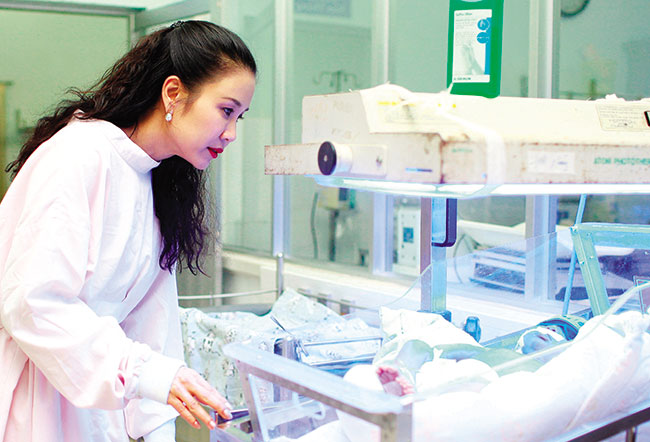Journey for children’s best start in life

Gift Samabhandhu visiting children in a hospital
Could you elaborate on Mead Johnson Nutrition’s CSR priorities?
For more than a century, Mead Johnson Nutrition has led the way in developing safe, high-quality, innovative products to help meet the nutritional needs of infants and children. With more than 70 products in over 50 countries, Mead Johnson is trusted by millions of parents and healthcare professionals around the world.
The people of Mead Johnson conduct business with integrity and seek out ways to foster strong communities and a healthy environment for generations to come. The company’s corporate citizenship programme ties into these ideas with three pillars: serving the marketplace, protecting the environment, and nurturing communities.
What is the scope of your company’s metabolics programme in Vietnam?
The metabolics programme is a partnership between Mead Johnson Nutrition Vietnam (MJN Vietnam), the Department of Maternal and Child Health under the Ministry of Health, and the National Hospital of Pediatrics (NPH). Looking back, MJN Vietnam’s initial support for NPH began from 2006 to 2008, mainly through product donation. After a short break, MJN Vietnam resumed its assistance to NPH in 2012. Two years later, MJN Vietnam decided to strengthen its commitment to support Vietnamese infants and children through a five-year project entitled “Raising awareness of screening, diagnosing, and treating congenital metabolic disorders”. The project aims to help infants with congenital metabolic disorders (CMD) achieve the best possible start in life. With active participation and engagement from various concerned stakeholders, the project has proven to be impactful and sustainable.
What is Mead Johnson’s goal with the metabolics programme?
Mead Johnson’s mission is to nourish the world’s children for the best start in life, including those facing health challenges such as metabolic disorders. Beyond the delivery of products, Mead Johnson has the expertise and desire to share critical scientific knowledge to help parents and healthcare professionals improve nutritional care for babies and children across Vietnam. The metabolic programme is designed to raise awareness of screening, diagnosing, and treating of these disorders, and thereby provide a better start for CMD-affected children.
How do you evaluate the success of the metabolics programme since its inception? How many Vietnamese infants have been helped?
With support from Mead Johnson, the newborn screening programme in Vietnam was piloted for the first time at NPH in 1998. NPH is the country’s centre for conducting the screening of high risk newborn babies, as well as diagnosing, treating, and managing patients with CMDs. In a 9-year period, from November 2004 to the end of October 2013, NPH screened and confirmed diagnoses for 171 young children with CMDs, among 1,629 patients with high risk. NPH has also identified 22 different CMDs found for the first time in Vietnam. Through the programme, NPH has treated, saved, and prevented disabilities for patients with CMDs in families which had already suffered the deaths of several children. Many of these patients now enjoy normal childhoods and are integrating into the community. To date, the project has treated and saved over one hundred children. Mead Johnson’s continued support for the metabolics programme is fully consistent with the commitment it has demonstrated over the past century.
What the stars mean:
★ Poor ★ ★ Promising ★★★ Good ★★★★ Very good ★★★★★ Exceptional
Latest News
More News
- Pegasus Tech Ventures steps up Vietnam focus (February 05, 2026 | 17:25)
- The generics industry: unlocking new growth drivers (February 04, 2026 | 17:39)
- Vietnam ready to increase purchases of US goods (February 04, 2026 | 15:55)
- Steel industry faces challenges in 2026 (February 03, 2026 | 17:20)
- State corporations poised to drive 2026 growth (February 03, 2026 | 13:58)
- Why high-tech talent will define Vietnam’s growth (February 02, 2026 | 10:47)
- FMCG resilience amid varying storms (February 02, 2026 | 10:00)
- Customs reforms strengthen business confidence, support trade growth (February 01, 2026 | 08:20)
- Vietnam and US to launch sixth trade negotiation round (January 30, 2026 | 15:19)
- Digital publishing emerges as key growth driver in Vietnam (January 30, 2026 | 10:59)















 Mobile Version
Mobile Version